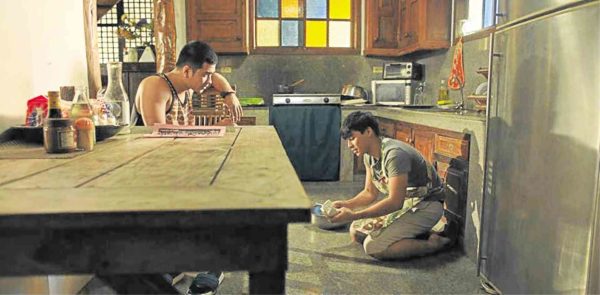
McCoy de Leon (right)and Jun Jun Quintana in “Instalado”
Farming and filmmaking don’t always go together. But the movers and shakers behind the ToFarm film festival wisely utilizes their advocacy to effectively mine the stories of the country’s underappreciated but crucial environment and farming sectors. After all, more than 100 million Filipinos rely on agricultural lands—which make up about 40 percent of the country’s land area—for their daily food sustenance.
If the proof of the pudding is really in the eating, the film event’s first edition last year did serve notice that it truly intended to give moviegoers more cinematic gourmet than fast-food dishes.
Proof? Paolo Villaluna’s sublime Shanghai fest-winning drama, “Pauwi Na (Pedicab),” and Zig Dulay’s best picture winner, “Paglipay (Crossings),” were among its rich yield.
Indeed, film festivals that put a premium on “profitability over quality” in the guise of serving moviegoers’ interests and entertainment needs can learn a thing or three about putting their money where their greedy mouths are.
In ToFarm’s case, even when the quality of its entries turns out to be uneven or underwhelming, they still pass muster because they tackle themes and subject matter that are mostly ignored by money- and motive-driven mainstream filmmaking.
Take Tara Illenberger’s “High Tide.” We were bummed out by its injudiciously staged and snooze-inducing slow scenes, but you won’t find its well-meaning story anywhere else.
As it examines how poverty and the deleterious effects of climate change can alter the lives of three kids (Forrest Kyle Buscato, Christine Mary Demaisip and Riena Christal Shin) and the clueless, cash-strapped adults (Sunshine Teodoro, Dalin Sarmiento and the grossly miscast Arthur Solinap) who look after them, it nonetheless gives viewers something to think about in the midst of all that lethargy.
For his part, director Jason Paul Laxamana has been churning out underwhelming films lately (“The Third Party,” “Mercury Is Mine”), but even those cinematic duds can’t deny the fact that he’s also one of Tinseltown’s most inventive and original storytellers around.
He can make something as contrived and derivative as “Pwera Usog” viewable, and his bizarrely ambitious sci-fi fable, “Instalado”—a timely and thematically alluring allegory about man’s myopic penchant for quick fixes and the dangers of modern technology—is no exception.
Told in laggardly fashion, the film—about a farm boy (the photogenic McCoy de Leon, more-than-proficient in a career-boosting role) who will do anything to get ahead in life—is further weighed down by its meandering pace and some episodic thrills that are more showy than substantial.
It may not be to everyone’s liking, but it pretty much gets its message across—and with proficient flair.
The irony isn’t lost on us when we note that Vic Acedillo Jr.’s “Kakampi” was one of last year’s “underperformers.”
This year, Acedillo bounces back with a vengeance by way of “Kamunggai,” and proves that a good film doesn’t need popular actors and the heady convolutions of telenovelas to win over viewers. Indeed, a filmmaker is only as good—or as bad—as his last film.
It follows how short-tempered 69-year-old government retiree Lolo Peping (Roger “Soe” Gonzales) forges an unlikely bond with his bratty grandson Kenken (Kent Raymond Basa).
As funny and bracingly unpredictable as it is heartwarming, the film tugs at viewers’ heartstrings without going over-the-top, and dispenses life-affirming lessons devoid of a proselytizing tone.
It doesn’t hurt that acting “newbies” Gonzales and Basa are just as noteworthy as the familiar faces in the cast—yes, the film provides an invigorating change of thespic pace for singers Dulce and Bayang Barrios, who prove that there’s more to them than their singing ability.
It examines its lead characters’ combustible relationships but smartly does away with vein-popping dramatic caterwauling and “manufactured” melodrama.
As if affirming that there’s beauty in simplicity, it shows pampered city-dwellers how “the other half” lives.
When its young protagonist finally comes to terms with his contentious situation, it becomes as much a learning moment for Ken and his aging new guardian as it is for the audience.
We’ve yet to see Topel Lee’s coming-of-age drama about fish pen boys, “Baklad,” and Joseph Abello’s “What Home Feels Like,” about a seaman (portrayed by Bembol Roco) who suddenly finds himself jobless.
For its part, Byron Bryant’s “Sinandomeng” is also worthy of picky viewers’ patronage. We like how the film plays out its endearing “dramedic” arc with straightforward simplicity, and espouses its empowering, no-frills views about the importance of perseverance and the belief that, yes, even women can take competent care of farms.
Sue Prado in “Sinandomeng”
Even more remarkable is the production’s delightful and “relatable” depiction of Filipino family life.
Bryant’s feel-good tale is about strong-willed Sinang (Sue Prado), who staunchly decides to take over the farming duties of her husband (Julio Diaz) after he’s found lifeless on their farm.
Couldn’t the other men in her family take over? Well, they’ve all decided to seek greener pastures as OFWs, so Sinang is left to take care of her “financially compromised” family and put food on the table.
Like “Kamunggai,” the film has leavening comic moments that provide a breather from its dramatic sequences.
Roger “Soe” Gonzales in “Kamunggai”
The characters are well threshed out, and the actors’ portrayals are carefully limned, paced by Prado, Star Orjaliza (as Sinang’s sister, Dory) and the exceptional Lou Veloso (as their hemiplegic father).
The production is enlivened even more by Pinoy folk songs that help move its story, as well as by charming moments that find its characters enthusiastically coming together for a common cause.
How’s that for Filipinos’ vaunted bayanihan spirit?